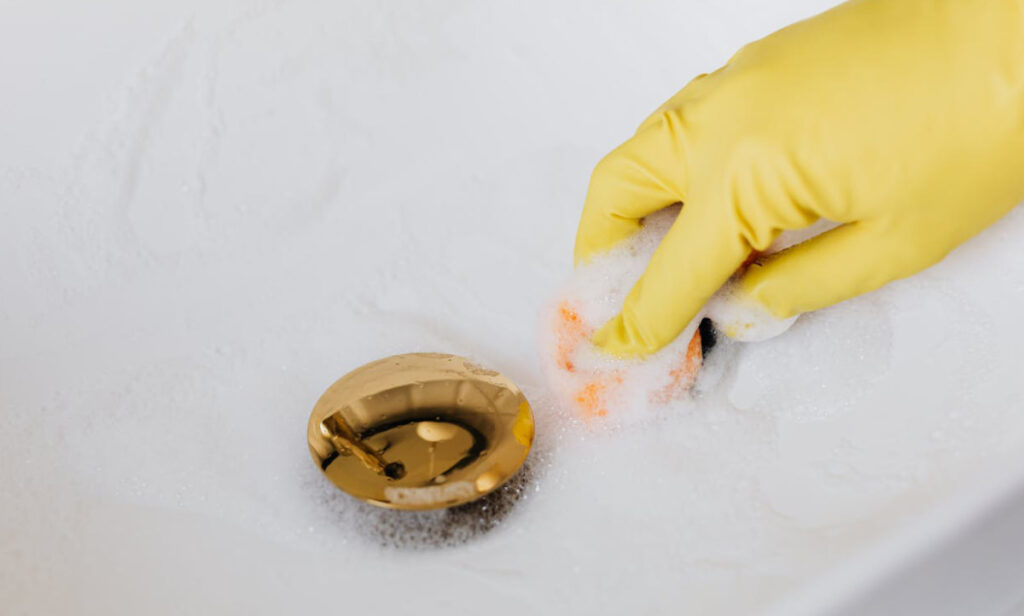Clogged drains are one of those problems that always seem to show up at the wrong moment. You are washing dishes, brushing your teeth, or running the shower, and the water suddenly pools instead of draining away. It is inconvenient, annoying, and sometimes a little gross. Many homeowners reach for chemical drain cleaners because they promise quick results, but those harsh products can be tough on pipes, harmful to the environment, and uncomfortable to breathe in.

That is why more people are turning to natural, eco-friendly drain cleaning methods. They are safer for your plumbing system, better for the planet, and often just as effective as conventional products. If you want cleaner drains without chemicals, there are several gentle but powerful options you can try at home.
Salt and Hot Water
Salt may sound too simple to be effective, but it can actually make a real difference when used correctly. The coarse texture helps scour the inside of pipes while the hot water melts grease and soap residue. It is a great option for mild drain clogs in bathroom sinks and kitchen drains that collect grease.
A generous handful of coarse salt followed by a slow pour of very hot water helps loosen buildup so the pipe can clear. It is not a substitute for professional drain cleaning services, but it can keep small problems from turning into persistent clogs. The method is gentle, inexpensive, and safe for every type of household plumbing.
Boiling Water Alone
It might be the simplest solution of all, but plain boiling water can work surprisingly well for certain types of drain clearing. Soap residue, grease, and oils stiffen as they cool inside pipes, forming sticky layers that grab onto hair or food scraps. When you pour boiling water slowly and repeatedly, it softens these layers and helps them wash away.
This method works best for kitchen sinks where grease is common. It is also helpful for bathroom drains clogged with toothpaste and soap scum. Although it will not fix severe drain clogs caused by roots or foreign objects, boiling water is a safe, eco-friendly maintenance habit that keeps pipes cleaner between deeper cleanings.
Benefits of using boiling water:
- Safe for most plumbing systems
- Simple and chemical-free
- Helps dissolve grease and residue
- Easy to repeat weekly for maintenance
Biodegradable Enzyme Cleaners
Enzyme-based cleaners are one of the most effective eco-friendly solutions available. These cleaners use natural bacteria and enzymes to break down organic material like hair, grease, soap scum, and food scraps. Instead of dissolving blockages with harsh chemicals, they digest the debris over time and help prevent future buildup.
These products work slowly, usually taking several hours or overnight, but they are incredibly gentle on pipes and septic systems. Unlike chemical cleaners that can damage older plumbing, enzyme cleaners strengthen the long-term health of your system by promoting cleaner, smoother pipes.
Why enzyme cleaners work well:
- Break down organic matter without harming plumbing
- Safe for septic systems
- Help prevent recurring blockages
- Eco-friendly and biodegradable
Cream of Tartar and Salt Mix
Cream of tartar may seem like something that should stay in the baking cupboard, but it can actually be useful for drain clog removal. When mixed with salt and hot water, it forms a mild cleaning solution that works gently on pipes without releasing fumes or corroding metal.
To use this method, mix equal parts cream of tartar and salt. Pour the mixture into the drain, then follow with very hot water. The salt helps scrub the pipe walls, while the cream of tartar works as a light cleaner and metal brightener.
This technique is particularly helpful for older homes in Seattle neighborhoods like Fremont, Green Lake, or Shoreline, where plumbing may be more fragile. It provides a safe, effective way to reduce buildup without stressing aging pipes.
Bio-Based Drain Sticks
Drain sticks are small, dissolvable sticks made with natural enzymes and cleaning agents. You drop one down the drain, and it slowly releases eco-friendly materials that break down grease and soap scum. Many homeowners use them as a preventive tool instead of waiting for drain clogs to form.
Drain sticks are especially helpful in kitchen sinks, where oils and food scraps tend to gather. They also reduce odors coming from slow drains, which can be a problem in older homes or seasonal vacation properties. They are not strong enough for major drain clearing, but they are a great maintenance booster between deeper cleanings or professional service calls.
How to Prevent Drain Clogs Naturally
While eco-friendly drain cleaning methods can be effective, preventing drain problems is even better. Simple habits can dramatically reduce the number of clogs you encounter throughout the year. Many homeowners do not realize how quickly buildup can form until water starts draining slowly. Fortunately, a few changes can make a big difference.
Try incorporating some of these habits:
- Install drain screens in sinks and showers
- Avoid pouring grease or oils down drains
- Rinse kitchen drains with hot water after washing dishes
- Run garbage disposals with cold water to solidify fats
- Use enzyme cleaners monthly to maintain clean pipes
These habits help reduce the need for drain cleaning services and keep your plumbing system healthier for the long term. Seattle homeowners often deal with older pipes that benefit from gentle care, so small steps can go a long way in preventing persistent clogs.
Why Eco-Friendly Methods Are Better for Your Home
Chemical drain cleaners may promise fast results, but they come with side effects. Many contain lye or strong acids that create heat inside your pipes. That heat can warp PVC, weaken metal joints, or damage older plumbing. Over time, the repeated use of harsh cleaners can shorten the lifespan of your system and increase the need for repairs.
Eco-friendly drain solutions avoid those risks. They work gently, so they do not put unnecessary strain on pipe materials. They also limit what gets washed into Seattle’s waterways, which is a concern in neighborhoods close to lakes, creeks, and coastal areas. Using natural solutions helps protect your plumbing, your environment, and your health.
Most importantly, natural solutions pair well with professional drain cleaning when deeper problems arise. They give you a way to maintain your drains in between service calls, so you are not dealing with emergencies as often.
When Home Methods Are Not Enough
There are times when natural solutions will not resolve a drain problem. If you notice recurring blockages, foul smells coming from drains, or water backing up into sinks or showers, it likely means there is a deeper issue. Tree roots, collapsed pipes, and severe buildup require specialized equipment to fix properly.
Professional plumbers use tools like augers, high-pressure hydrojetting equipment, and drain cameras to find and fix the problem permanently. This level of drain cleaning is safe for pipes and effective against even the toughest blockages. When home remedies do not work, or when the same drain keeps clogging, it is best to bring in a professional who can perform reliable drain cleaning services.
In fact, early intervention can prevent bigger issues like water damage or sewer line backups. If something feels off about your plumbing, it is better to address it sooner rather than later.
Dealing With Persistent Clogs? Gene Johnson Is Only One Call Away
If you have tried natural solutions but still struggle with persistent clogs, our team at Gene Johnson Heating, Cooling, Plumbing, and Electrical is always ready to help. We handle clogs of every kind, from slow drains to sewer line blockages, using methods that are effective and safe for your plumbing system.
We provide drain clog removal, drain clearing, and full-service drain cleaning throughout Seattle and the surrounding cities. When you call us, you can count on honest recommendations and clear communication from start to finish. Reach out anytime, and we will help your drains flow freely again so you can get back to enjoying your home without the hassle.





